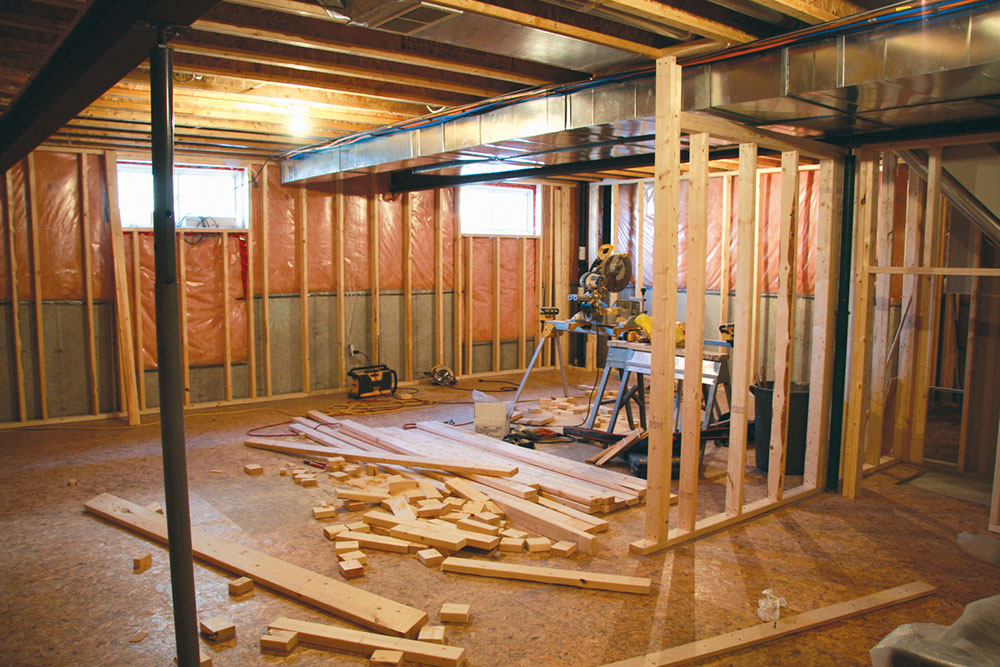
6 common mistakes to avoid while renovating a basement
In most homes, basements are often underutilized, holding every extra item, from old decor elements to damaged appliances. To add value to this space, sometimes homeowners convert it to makeshift gyms or laundry rooms without any aesthetics or functional measures. However, due to a lack of proper planning and guidance, homeowners often make basement renovation mistakes that can compromise the space’s value. Here are some common mistakes to avoid while remodeling a basement.
Forgetting to get the permits
It is one of the biggest mistakes a homeowner can make while renovating their basement. Since a permit is mandatory for basement renovation everywhere, it would be illegal and dangerous not to have one. It is because permits ensure that work is done in adherence to safety standards and protocols. Therefore, homeowners must contact the local municipality and enquire about the various documentation and forms that are necessary for the type of work planned for the basement. The homeowner or the contractor can do all this paperwork. Once the permits are obtained, board inspectors will visit the house and check whether the work being done is according to the standards and codes. If the work does not meet the safety standards, the inspectors will inform how to address this issue before moving on to the next phase of the renovation project.
Deciding to go the DIY way instead of hiring professionals
While thinking about a basement renovation, an important factor to consider is whether one wants to do the work themselves or hire a professional. It depends on one’s skill set and comfort level. Besides, renovation requires a lot of commitment in terms of time. So, one must determine if they can dedicate that much time to the project. If answers to all these questions are negative, then going the DIY way would be a mistake. Instead, hire professionals to ensure work is done correctly, safely, and on time, without hassles.
Skipping the home inspection
Since the basement is located right below the house, it is prone to many problems that can develop over the years. This is particularly true for homes that have gone through multiple owners. The problems usually arise from all the plumbing and electrical systems in the basement. There might be a leakage, seepage, or wire breakage that may be hidden under the surface. Once the renovation begins and these problems are discovered, it will bring on various complications. In addition, the expenses will suddenly go up. It is advised not to ignore the importance of a home inspection to avoid all these hassles. Hire a professional home inspector before starting the renovation work to identify potential issues and determine how to solve them.
Avoiding decluttering of the basement
Before beginning the renovation project, it is important to clear out the basement space that holds every extra thing in the house. The space should be vacant before starting the work, or else it would be a safety hazard to work around stacks of cartons and bulky junk furniture. Avoid this mistake by sorting all the stuff in the basement. Move out things that can pose a safety threat. Items that are no longer useful can be thrown away or sold in a garage sale. Another option is to donate things that are in good condition but not needed in the house. For things that are worth keeping, homeowners can rent a storage unit and keep everything there until the renovation work is completed.
Skimping on the budget
Often, the renovation of the basement is done as an afterthought. Therefore, many homeowners end up cutting corners while fixing the budget for the project. Because of this, the quality of materials often gets affected. In addition, the limited funds do not make it possible to invest in good furnishings or a reliable contractor. It mostly happens when the basement is considered a disposal space of the house. To avoid this, consider the basement an extension of the home space rather than a storage unit to increase its overall value. This shift in perspective can help one allocate more funds to the renovation project to ensure that high-quality materials are used and professional contractors are hired to do the job.
Not waterproofing the floors and walls
Since most of the plumbing and drainage systems are located in the basement, the room is highly prone to leaks. Besides, in closed spaces like basements, there is a high chance of moisture and dampness growing, increasing the risk of mold growth. Aside from this, water damage can go too deep, damaging all the new renovation and remodeling work. To avoid all such issues, it is important to waterproof all the walls and flooring of the basement area. It can include sealing the walls with hyaluronic cement. Additionally, use water-resistant flooring materials, avoiding wood and carpet. Additionally, drainage systems like dry wells or French drains should be installed outside the house so that rainwater doesn’t seep through and cause damage to the basement. In addition, all the holes and cracks must be filled up using a concrete foundation to prevent water damage.
By avoiding these common mistakes and properly planning the basement remodeling project, one can optimize the value and functionality of this space.




